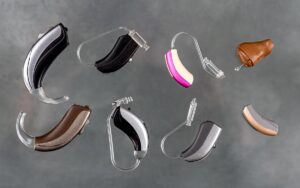For you and the people you love, living with hearing loss can take some work to adjust to. Sometimes, it can even be dangerous.
What’s going to happen if you can’t hear a smoke detector or somebody calling your name? Car sounds can warn you about hazards ahead, but if you have untreated hearing loss, you won’t hear them.
But the “what ifs” aren’t something you should stress over. If you have untreated hearing loss, getting a hearing test is the first thing you should do. Here are some recommendations to help keep individuals with hearing aids and their families safer whether or not they’re using their hearing aid.
1. Take a friend with you when you leave the house
Bring someone with good hearing out with you if possible. If that isn’t possible, ask people to face you when speaking to you so that you will have an easier time hearing them.
2. Stay focused when you’re driving
Because you can depend on your hearing less, it’s essential to reduce other distractions when driving. Don’t use your phone or GPS when you’re driving, just pull over if you need to change your route. If you think you have a problem with your hearing aid, come see us before getting behind the wheel.
Don’t feel ashamed if you need to turn off the radio or request that passengers stop talking during more critical moments of your drive. Safety first!
3. Consider a service animal
You think of service dogs as helpful for people with visual impairment, epilepsy, or other conditions. But they can also be extremely helpful to individuals with auditory challenges. You can be warned about danger by a service dog. When somebody is at your door they can let you know.
Not only can they assist you with these challenges, but they also make a great companion.
4. Have a plan
Before an emergency happens, make a plan. Talk it over it with other people. As an example, be certain your family knows that you will be in the basement if a tornado hits. In case of a fire, choose a designated location that you’ll be outside the house.
This way, if something were to happen and you became trapped, family and emergency personnel can act rapidly to help you.
5. When you’re driving, pay attention to visual cues
Over time, it’s likely that your hearing loss has worsened. If your hearing aids aren’t regularly adjusted, you might find yourself relying more on your eyes. Be aware of flashing lights on the road since you may not hear sirens. When children or pedestrians are around, stay extra alert.
6. Share your hearing trouble with family and friends
Nobody wants to disclose that they have hearing impairment, but those in your life need to know. You might need to get to safety and those around you will be able to make you aware of something you might have missed. If they’re not aware that you’re unable to hear, they will assume that you hear it too.
7. Be vigilant about the maintenance of your vehicle
As somebody living with hearing loss, you may not be able to hear strange thumps, clicks, or screeches when you’re driving. These can signal a serious problem. Your car could take serious damage and your safety could be at risk if these sounds aren’t dealt with. It’s a good idea to ask a trusted mechanic for their opinion on the condition of your vehicle when you take it in for an oil change or inspection.
8. Have your hearing impairment treated
If you want to be safe, getting your hearing loss treated is crucial. Get your hearing tested annually to identify when your hearing loss is extensive enough to require an assistive device. Don’t wait because of time constraints, money, or pride. Modern hearing aids are discreet, functional, and surprisingly affordable. A hearing aid can help you remain safer in all aspects of your life.
[blogcta]





